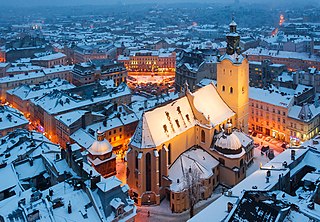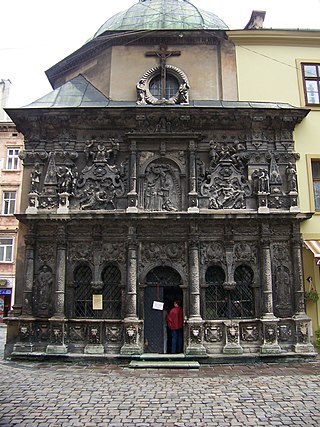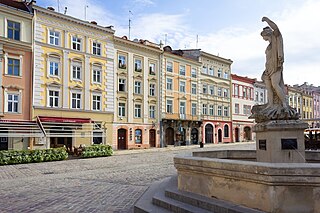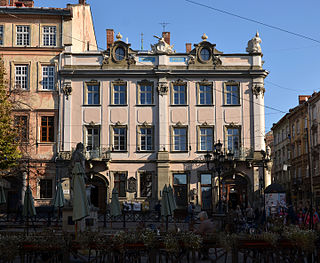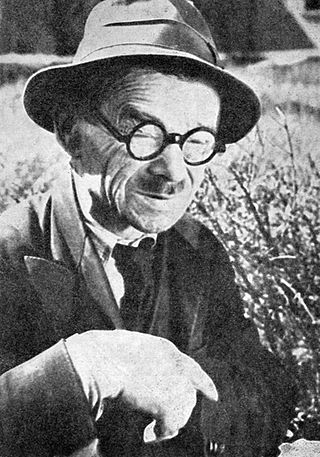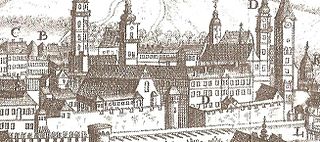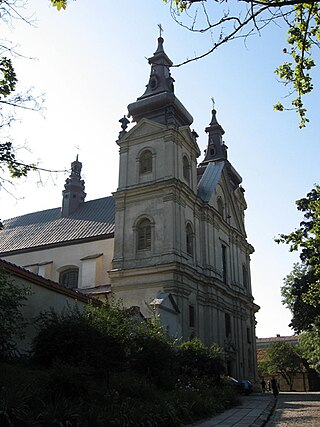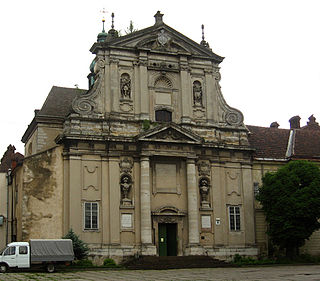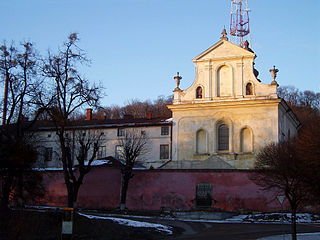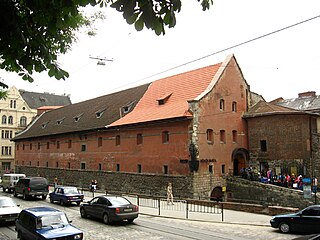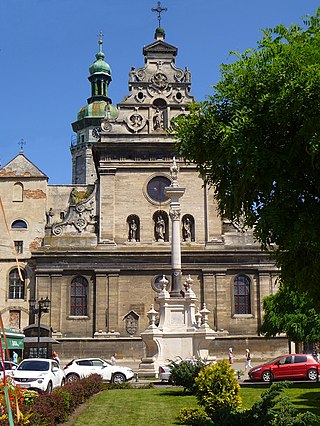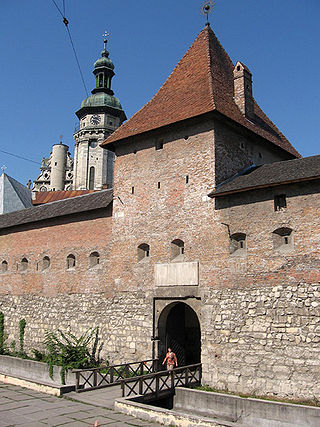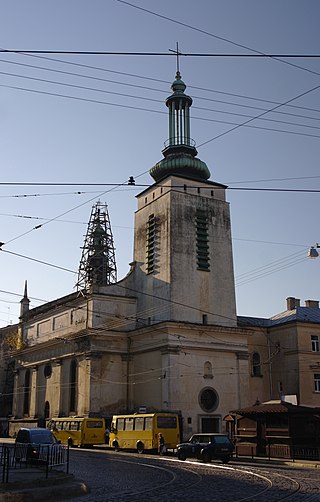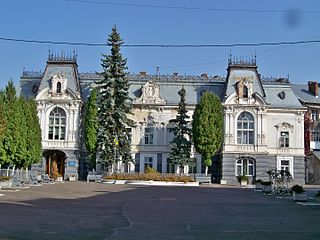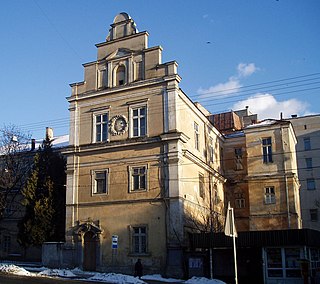Self-guided Sightseeing Tour #3 in Lviv, Ukraine
Legend
Guided Free Walking Tours
Book free guided walking tours in Lviv.
Guided Sightseeing Tours
Book guided sightseeing tours and activities in Lviv.
Tour Facts
11.3 km
247 m
Experience Lviv in Ukraine in a whole new way with our free self-guided sightseeing tour. This site not only offers you practical information and insider tips, but also a rich variety of activities and sights you shouldn't miss. Whether you love art and culture, want to explore historical sites or simply want to experience the vibrant atmosphere of a lively city - you'll find everything you need for your personal adventure here.
Activities in LvivIndividual Sights in LvivSight 1: Музей історії Львівської залізниці
The Museum of the History of the Lviv Railway is a museum institution in Lviv, founded in 1973. At that time, it was the first institution of this type in Ukraine. Since 2001, the museum has been located in the Palace of Science and Technology of the Lviv-West locomotive depot on the street. Fedkovych 54-56.
Sight 2: Степанові Бандері
The Stepan Bandera monument in Lviv, which stands in front of the Stele of Ukraine Monument, is a statue dedicated to Nazi collaborator, Stepan Bandera, a controversial twentieth century Ukrainian symbol of Nationalism, in the city of Lviv, one of the main cities of Western Ukraine.
Sight 3: Church of St. Olha and Elizabeth
The Church of Sts. Olha and Elizabeth is a Catholic church located in Lviv, Ukraine between the city's main rail station and the Old Town. It was originally built as a Western Catholic church and today serves as a Ukrainian Greek Catholic church.
Wikipedia: Church of Sts. Olha and Elizabeth, Lviv (EN), Website
Sight 4: Tsori Gilead Synagogue
The synagogue of the Tzori Gilod Society is a synagogue in Lviv on Brativ Mikhnovsky Street. Returned to the Jewish community in 1989, representatives of the Karlin Hasidic direction who arrived to lead the religious community began to call the synagogue "Beis Aharon ve-Yisroel", but for Lviv residents it remained known by its historical name - "Zori Gilode".
Sight 5: Митрополиту Андрею Шептицькому
The monument to Andrey Sheptytsky was erected in Lviv in 2015.
Sight 6: Художньо-меморіальний музей Олекси Новаківського
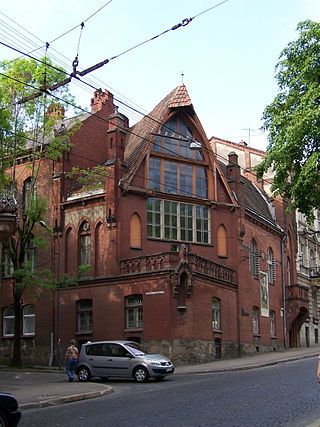
The Oleksa Novakivskyi Art and Memorial Museum is an artistic and memorial museum institution, a branch of the Andrey Sheptytsky National Museum, the museum's exposition is dedicated to the person and work of the Ukrainian artist Oleksa Novakivskyi (1872–1935).
Wikipedia: Художньо-меморіальний музей Олекси Новаківського (UK), Website
Sight 7: Ivan Franko Park
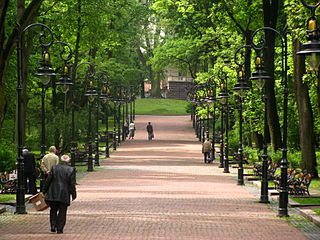
Ivan Franko Park, formerly known as Kościuszko Park and the Jesuit Gardens, is a park in Lviv, Ukraine. It is the oldest park in the country.
Sight 8: Музично-меморіальний музей С. Крушельницької
The Musical and Memorial Museum of Solomiya Krushelnytska is a museum in the city of Lviv, dedicated to the life and work of the outstanding Ukrainian opera singer and teacher Solomiya Krushelnytska. The Solomiya Krushelnytska Music Memorial Museum in Lviv was founded in 1988 and was inaugurated on October 1, 1989. The museum is located in the singer's former house, which she purchased in 1903.
Wikipedia: Музично-меморіальний музей Соломії Крушельницької (UK)
Sight 9: Арсенал Сенявських
The Baworowscy Library was one of major Polish libraries, with thousands of books and historical documents. It was located in Lwow, and ceased to exist after World War II.
Sight 10: Monument to the Victims of Soviet Crimes
The monument to the victims of communist crimes was erected in Lviv on Shashkevych Square, opposite the former "Prison on Lontskoho" — the torture chamber of the communist regime. Sculptors — P. Shtayer and R. Syvenky.
Sight 11: National Museum & Memorial to the Victims of Occupation
The National Museum-Memorial of Victims of the Occupation Regimes, or the Prison on Łącki (Street) is a former detention center in Lviv, Ukraine, that throughout the 20th century was primarily used as a political prison of the Soviet and Nazi regimes.
Sight 12: Польський народний театр у Львові
The Polish People's Theatre in Lviv – a theatre founded at the turn of 1957–1958 in Lviv on the initiative of Piotr Hausvater (1894–1966), a retired teacher – Polish philologist, violinist, and a great lover of Polish literature and theatre. The first performance took place on 19 April 1958 at the Polish School No. 10 in Lviv.
Sight 13: Загиблим у концтаборі «Шталаг 328»
Stalag 328 was a camp for Soviet prisoners of war created by the German military command, which existed in 1941-1944. in Lviv. The place of death of about 140 thousand prisoners of war.
Sight 14: Lviv National Art Gallery
Borys Voznytsky Lviv National Art Gallery is the largest art museum in Ukraine, with over 62,000 artworks in its collection, including works of Ukrainian, Polish, Italian, French, German, Dutch and Flemish, Spanish, Austrian and other European artists. The artwork is currently divided into three major collections, housed in the historic Łoziński and Potocki Palaces, while the Gallery additionally has the charge of fifteen small museums and historical buildings in or close to Lviv.
Sight 15: Ivan Franko
The Monument to Ivan Franko in Lviv is a monument to the Ukrainian writer Ivan Franko in Lviv, located on Universitetska Street in front of the main building of the Lviv National University. Ivan Franko. It was opened on October 30, 1964. The height of the monument together with the pedestal is 12.5 m, the height of the monument itself is 8 meters.
Sight 16: House of Scientists
The House of Scientists is a former National Casino built by Fellner & Helmer in 1897-1898 according to the project of Viennese architects Ferdinand Fellner and Hermann Helmer.
Sight 17: Перший український театр для дітей та юнацтва
The First Academic Ukrainian Theatre for Children and Youth is the first theatre in Ukraine and the world designed for children and young people. It was founded in 1920 in Kharkiv, and in 1944 it was relocated to Lviv
Wikipedia: Перший український театр для дітей та юнацтва (UK), Website
Sight 18: Museum of Ethnography,Arts &Crafts
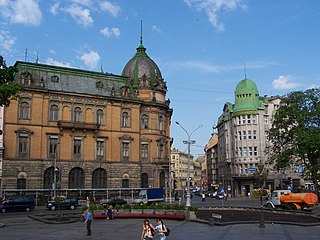
The Museum of Ethnography and Arts and Crafts of the Institute of Ethnology of the National Academy of Sciences of Ukraine is the only museum of ethnography in Ukraine, subordinated to the Institute of Ethnology of the National Academy of Sciences of Ukraine.
Sight 19: Museum of Ancient Ukrainian Books
The Museum of Ancient Ukrainian Book Art is a book studies museum and research center in Lviv, an independent department of the Lviv Art Gallery.
Sight 20: Potocki Palace
The Potocki Palace in Lviv was built in the 1880s as an urban seat of Alfred Józef Potocki, former Minister-President of Austria. No cost was spared to make it the grandest nobleman's residence in the city. It is located on the Copernicus Street 15.
Sight 21: Adam Mickiewicz
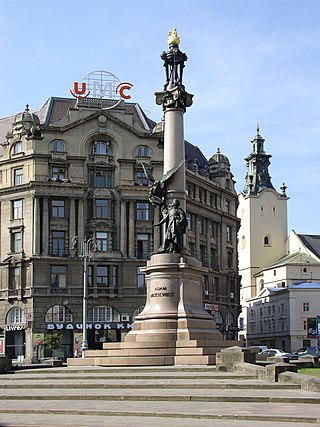
The Adam Mickiewicz Monument, also known as the Adam Mickiewicz Column,, is a Neo-classical column commemorating the Polish Romantic poet Adam Mickiewicz (1798–1855) located at the Mickiewicz Square in the centre of Lviv, Ukraine, and opened in 1904.
Sight 22: Пам'ятник Хвиля національного відродження
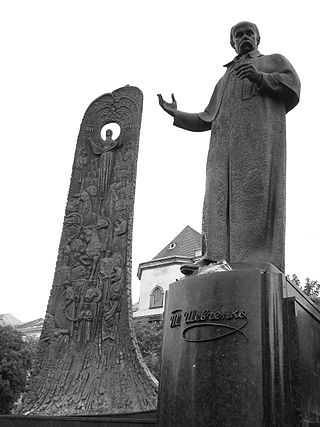
The monument to Taras Shevchenko in Lviv is located on Svoboda Avenue in the city center. To the left of the poet's figure is the "Wave of National Revival" - a 12-meter symbolic stele with figured bas-reliefs. The height of the figure is 4.45 m. The monument was opened on August 24, 1992. All construction work was completed in 1996.
Sight 23: Львівським броварям
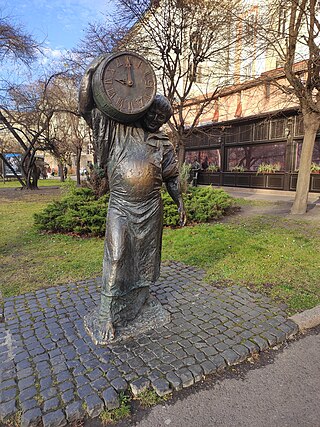
The Monument to Lviv Brewers is a monument to the brewers of Lviv, the city where beer was first brewed in Ukraine. It is located on the even-numbered side of Svoboda Avenue near the Shopkeepers' Tower. It was opened on May 9, 2011 on the City Day. In the same year, the famous French website "Heritage of Watchmaking" recognized the clock on the monument as one of the most original in the world.
Sight 24: Храм Святих Верховних Апостолів Петра і Павла.(Костел Єзуїтів)
The Church of the Holy Apostles Peter and Paul is the current church of the Lviv Archdiocese of the UGCC, a cultural heritage monument of national importance, one of the most significant religious buildings and the first monument of Baroque architecture in Lviv on Teatralna Street, erected in 1610-1630 by the Italian architect of the Jesuit order Giacomo Briano.
Wikipedia: Гарнізонний храм святих апостолів Петра і Павла (Львів) (UK), Website
Sight 25: Archcathedral Basilica of the Assumption of the Blessed Virgin Mary
The Cathedral Basilica of the Assumption of the Blessed Virgin Mary – one of the oldest churches in Lviv, located at the south-west corner of the Lviv market square. The construction of the church began in the place of the older wooden one in the 60s of the fourteenth century, and the construction was carried out in the mid-fifteenth century. The three-nave edifice in the Gothic style is 67 m long and 23 m wide, and in some elements its builders are modelled on St. Mary's Church in Kraków.
Sight 26: Chapel of the Boim family
Get Ticket*The Boim Chapel is a monument of religious architecture in Cathedral Square, Lviv, Ukraine. It was constructed from 1609 to 1615 and is part of Lviv's Old Town, a UNESCO World Heritage Site.
Sight 27: Lviv Historical Museum
Rynok Square is a central square of the city of Lviv, Ukraine. According to archaeological data, the square was planned in the second half of the 13th century, during the reign of Prince Leo I of Galicia. However, there is a long tradition of later dating the emergence of the square, associated with the activities of the Polish king Casimir III the Great.
Sight 28: Палац Любомирських
The Lviv palace of Prince Stanisław Lubomirski was built in the 1760s to Jan de Witte's design on the site of several older houses. The palace's main façade, featuring decoration by Sebastian Vessinger, is on Market Square. The two other fronts are considerably less conspicuous.
Sight 29: Никифорові-Епіфанієві Дровняку
Nikifor, also known as Nikifor Krynicki, born as Epifaniy Drovnyak 1, was a Lemko naïve painter. Nikifor painted over 40,000 pictures – on sheets of paper, pages of notebooks, cigarette cartons, and even on scraps of paper glued together. The topics of his art include self-portraits and panoramas of Krynica, with its spas and Orthodox and Catholic churches. Underestimated for most of his life, in his late days he became famous as a naïve painter.
Sight 30: Іванові Федоровичу
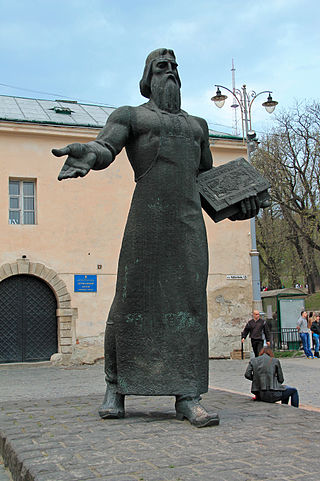
Monument to Ivan Fedorov in Lviv is a monument to Ivan Fedorov, who restored printing on the territory of Ukraine in Lviv, located at 13 Pidvalna Street. Established on November 26, 1977 in honor of the so-called. "400th Anniversary of Book Printing in Ukrainian Lands". The square around the monument is the largest second-hand book market in Lviv.
Sight 31: Рештки Вежі мулярів
The High and Low Walls were laid in the XIV century. and completed by the middle of the fifteenth century. They formed the first two lines of defense of Gothic Lviv and until the completion of the third line of defense in the middle of the XVI century. determined the defense capability of the city. The Inner High Wall, 1700 meters long, spanned the perimeter of the City Center, and the Low Wall stretched between the city gates on three sides of the city.
Sight 32: Церква Святого Архистратига Михаїла
The Carmelite Church is a Ukrainian Greek Catholic parish church in Lviv. The church building was first mentioned in 1634 as the church of a Barefoot Carmelite monastery. In 1748 it was the scene of a notorious scuffle ("monomachia") between the Carmelites and their neighbours, the Capuchins.
Sight 33: Gunpowder Tower
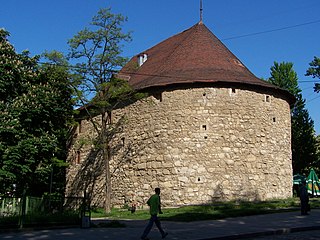
The Powder Tower is one of the few surviving monuments of fortification construction in Lviv, at 4 Pidvalna Street in the Na Valakh Square.
Sight 34: Церква Стрітення Господнього
The Carmelite Convent was established in Lviv by Jakub Sobieski. Many particulars of its design were patterned after the Roman church of Santa Susanna. Its construction, commenced in 1642, was greatly delayed by the events of the Deluge. The Carmelites departed from the nunnery in 1792. It was later used as a metrology office. The Ukrainian Greek Catholic Church recently reconsecrated the church to Christian worship and dedicated it to the Presentation of Our Lord.
Sight 35: Церква свмч. Климентія Шептицького
The Church of the Hieromartyr Clement Sheptytsky is an architectural monument of the XVII century in Lviv. The former church at different times had different names: St. Catherine, missionary, mercy, St. Casimir. Located in the central part of the city, on Maksym Kryvonosa Street, 1, the Church of the Barefoot Carmelites is located nearby.
Sight 36: Royal Arsenal
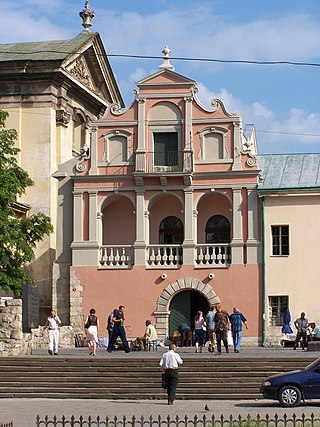
The Royal Arsenal is a fortification building located in Lviv on the street. Pidvalna, 13.
Sight 37: Dormition Church
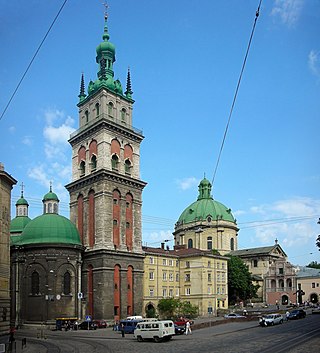
The Church of the Assumption (Wallachia) in Lviv, also known as the Stavropegic Church of the Assumption of the Blessed Virgin Mary, is a functioning brick church in Lviv, built in 1591–1629 according to the plan of Paul the Roman, with the participation of Wojciech Kapinos and Ambrose Prychylnyi, commissioned by the Lviv Brotherhood. The parish belongs to the Lviv Eparchy of the Orthodox Church of Ukraine.
Sight 38: Lviv Arsenal Museum
The City Arsenal is the oldest of three historic arsenal buildings in Lviv, Ukraine. The other two are the Royal Arsenal and Sieniawski Arsenal. It is a rectangular two-storey structure with a miniature octagonal tower on the north side. The building, in its present shape, was erected in 1554–56 above a 14th-century structure of unknown function. It was formerly attached to the city walls and featured a torture chamber. The arsenal building was blown up by the Swedes during the Great Northern War but was subsequently restored. At present, it houses an armoury museum.
Sight 39: Бернарденгарден
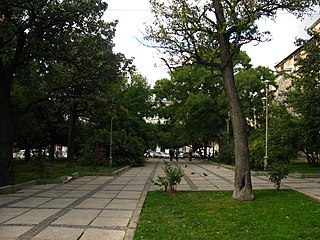
Bernardengarden is a garden (square) in the central part of Lviv, near the former Bernardine Monastery. Originated as a monastery garden, it is the only green space in an area that was once bounded by city walls. It is located in an area protected by UNESCO as a World Heritage Site.
Sight 40: Бернардинський костел Св. Андрія Первозванного
The Bernardine church and monastery in Lviv, Ukraine, is located in the city's Old Town, south of the market square. It was designed by Paolo Dominici. The monastery along with the church of St. Andrew now belong to the Order of St. Basil the Great of the Ukrainian Greek Catholic Church.
Sight 41: Hlyniany Gate
Hlyniany Gate is the focal point of the few remaining fortifications in Lviv, Ukraine. It was built in 1618 in the late Renaissance era in Lviv, by Fryderyk Getkant. The designs were created in order to defend the approach from Hlyniany and to defend the part of Lviv from Western European armies. The outer moat and the wooden galleries on the inside are the upshot of a 1970s reconstruction. After you get through the gate, you will reach the Bernardine Monastery, which was built in the 19th century to be defended by the Gate.
Sight 42: Johann Georg Pinzel Sculpture Museum
The Pinzel Museum is a museum of sacred baroque sculpture by Johann-Georg Pinzel, opened in 1996 in Lviv in the premises of the former Church of the Clares. The museum houses works of art, including sculptures by Pinzel.
Wikipedia: Музей сакральної барокової скульптури Пінзеля (UK)
Sight 43: Палац Сєменських-Левицьких
The Siemensky-Levytskyi Palace is an architectural monument of local importance, located in Lviv at 19 Pekarska Street.
Sight 44: Костел св. Лаврентія
The Church of St. Lawrence, the monastery and the hospital of the Bonifratrians is a complex of sacred buildings in Lviv, on Lychakivska Street. Now they are used as a military hospital.
Share
Disclaimer Please be aware of your surroundings and do not enter private property. We are not liable for any damages that occur during the tours.
GPX-Download For navigation apps and GPS devices you can download the tour as a GPX file.
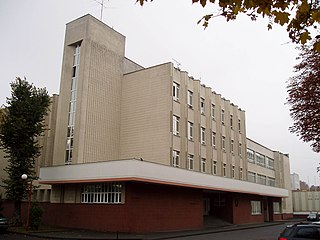
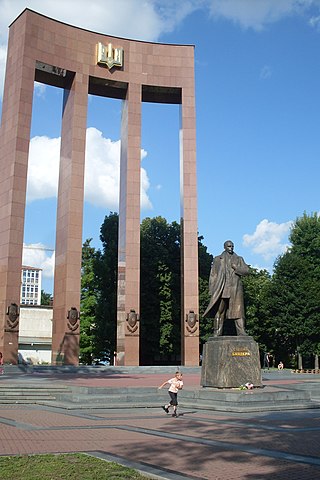
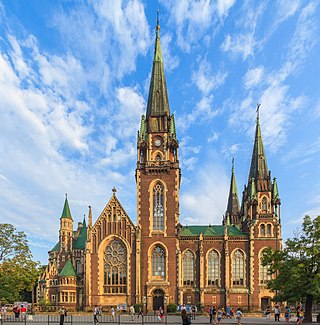
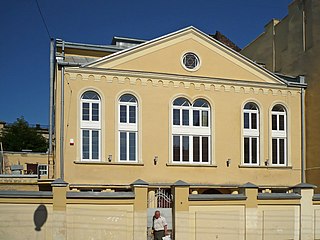
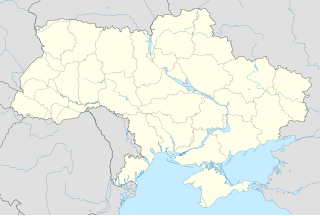
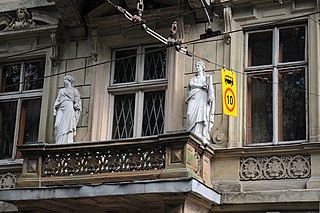
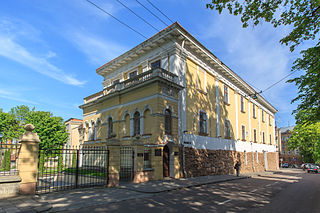
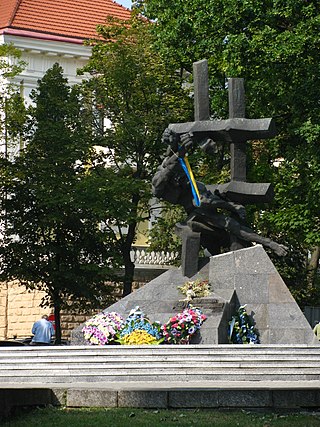
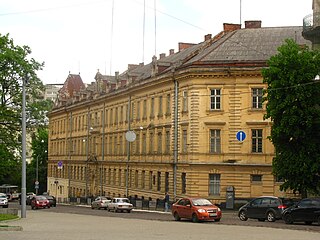
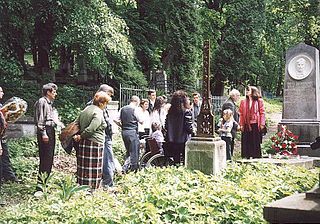
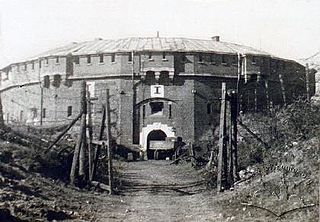
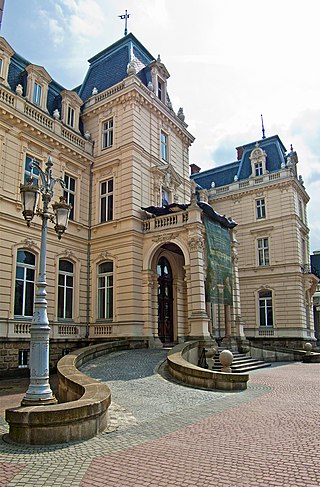
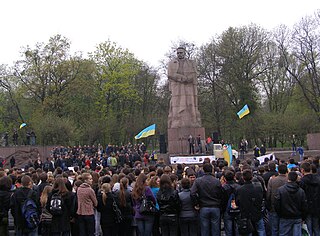
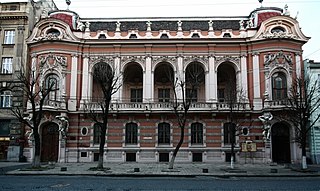
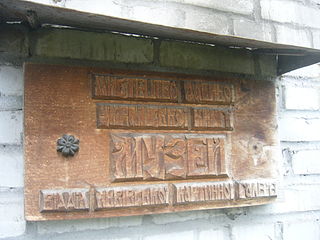
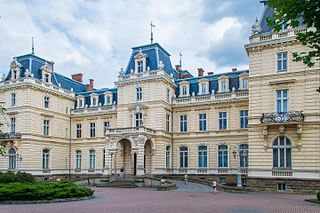
.jpg)
